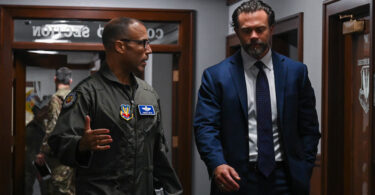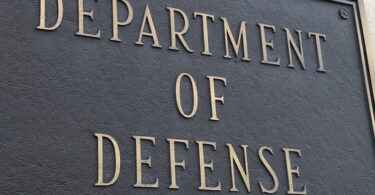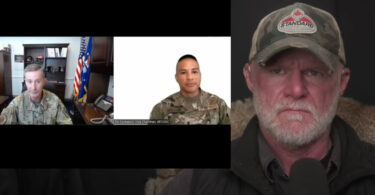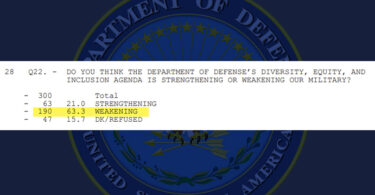Are our military forces less prepared today than they were after World War II?
Join us as Commander Al Palmer, USN ret, and Colonel Ron Scott, PhD, USAF ret, USAFA ’73, the President & CEO of STARRS (Stand Together Against Racism and Radicalization in the Services) confront this disturbing question on STARRS new podcast “STARRS & Stripes”.
We uncover the findings from the Commission on the National Defense Strategy and recall pivotal moments in military history, such as the Vietnam War, that showcased a united front irrespective of race or background.
In our discussion, we take a hard look at the effects of Diversity, Equity, and Inclusion (DEI) initiatives on military cohesion. By examining the roots of socialist ideology in America and its implementation in various sectors, we illustrate how these efforts can sometimes foster division rather than unity.
The conversation shines a light on the chilling effect recent political events have had on free speech and assembly, raising vital questions about the ideological trajectory of our institutions.
Finally, we tackle the pervasive influence of cancel culture and censorship on public discourse. From the media blackout surrounding the Hunter Biden laptop scandal to the intricate political manipulations of the Watergate era, we explore how information control shapes civic understanding.
Through personal anecdotes and historical revelations, we highlight the need for collective responsibility and the influential work of STARRS in bridging these divides.
Tune in for a comprehensive look at the challenges facing our military and society today and discover actionable steps toward a more unified future.
Watch:
Or listen:
CLICK HERE to go to podcast page: Also available on your favorite audio podcast platforms.
0:09: Challenges in Military Readiness
13:00: Impact of DEI and Marxism Infiltration
20:35: Battle Against Information Control
28:07: American Civic Responsibility and Valor
41:33: Citizens Finding Solutions Together
Report: Congressional Panel Finds that U.S. Military Is ‘Not Prepared’ for War
Transcription
CDR Al Palmer, USN ret: What I’m going to do today is, have our president, colonel Ron Scott, with us and we’re going to talk a little bit about the objectives of what we do at STARRS and the challenges that our country faces today. Ron, it’s good to have you with us, sir. Welcome back.
Col Ron Scott, PhD, USAF ret: Thanks Al, callsign “Bigfoot.
CDR Al Palmer, USN ret: So listen. So you and I were talking earlier today about a current event that’s happening today. The committee for I’m sorry, the commission for the National Defense Strategy was testifying before the Senate today and they’re publishing their report on the status of the military and the view looking forward for where we’re going to go and a bit about where we’ve been in the past. As I watched that today, I was astounded by the fact that their prediction is that the state of the forces today is no better than it was in 1945. In fact, it’s actually reaching the breaking point for readiness and for our ability to fight more than one major conflict at a time. So, having said that, you’ve been around for about as long as I have, the two of us have seen a lot of changes in the services. What do you think about that?
Col Ron Scott, PhD, USAF ret: Well, I think it’s a shock to a lot of people who really have an understanding of the context within which that information is being portrayed.
Col Ron Scott, PhD, USAF ret: One of my concerns is that most Americans have really very little understanding of the significance of these developments, and so STARRS, as you know, really was alerted to these developments back in the summer of 2020, when we saw a football video that was put out on 7 July of 2020 by the Air Force Academy football coaches talking about Black Lives Matter in a militant tone. Three minutes, they mentioned Black Lives Matter seven times and then listed five examples of racial injustice all five patently false. Now we understood the sentiment stemmed from the George Floyd incident two months prior, but the whole nation was now becoming roiled in these protests that were taking place across the nation, and it startled us that Air Force Academy football coaches would be involved in sending out that kind of a message, and that’s what got us started in terms of a lot of the things that have been flying under the radar in America, and it directly affects our military readiness. As we see, retention is down, recruiting is abysmal. All the services perhaps the Marines aren’t getting enough people to meet their force structure requirements.
CDR Al Palmer, USN ret: So, as you look at that from the Academy standpoint, back when that happened with the coaches, was that vetted by the superintendent or did that go through any kind of a chain of ?
Col Ron Scott, PhD, USAF ret: Great question. We asked about that and the superintendent at the time, General Jay Silveria, defended it. He said they cleared it through public affairs and the judge advocate general and furthermore he supported the video. The day after that video was released, General Silveria released a letter to the Academy family talking about systemic racism in America, to include the Air Force Academy, and so he in that letter directed an assessment of the extent of systemic racism at the Academy so they could adjust policies and procedures accordingly.
CDR Al Palmer, USN ret: So do you think that was just kind of going along with the more public narrative at the time that there was systemic racism in everything that we do? But if that was true, then how do you reconcile that against the record of the military since the end of World War II, when we desegregated the military for the most part, and then today, where we go on the basis of merit? How did those two things go together, or do they not?
Col Ron Scott, PhD, USAF ret: They don’t. In 1947, when Truman integrated the armed forces, the Department of Defense led our nation in getting beyond discrimination and racism. And so, as I entered the Air Force in 1969, at the Air Force Academy, we had just seen the effects of the Civil Rights Act of 1964. And there was a lot of tension across America. In fact, when I was attending a high school in Joliet, illinois, we had race riots and you know we were all trying to figure out what’s happening. I didn’t feel I was bigoted or racist. I had black friends so, but that was our experience.
Col Ron Scott, PhD, USAF ret: We were going through a time in America when there were enough good people saying that. You know, we’ve got vestiges of racism in America. The Jim Crow laws of the 1960s and earlier than that that promoted discrimination. Our nation was ready to get beyond that and so it was a cultural change, which is very difficult to change attitudes and mores and norms, but we step forward to do that, to say discrimination is wrong. And so the Department of Defense, in my opinion, led that effort in recognizing that we should all be colorblind and that we judge people based on merit and achievement.
CDR Al Palmer, USN ret: Well, and if you fast forward a little bit from after post-World War II into Korea and Vietnam, particularly in Vietnam, I mean, I remember flying over North Vietnam and quite a few times someone shot down, lots of times at night. You don’t know who that is. They’re on the ground, they’re on a radio, they’re trying to get help. There are helicopters coming on the way with a crew to rescue them. Nobody asked what the race or ethnicity or the background was of the guys who were shot down. No one asked, when they approached and lowered the hookup for them to get retrieved, what their race was or who they were from or where they grew up. Everybody worked together to solve that problem, get them out, and when they got back, you know what? They all showed up at the stag bar together and celebrated together, and that’s the way that it has been for the most part I think since then.
Col Ron Scott, PhD, USAF ret: Well, and during that time, Al, there was a black colonel in Vietnam, Chappie James, and this vice president was a gentleman named Robin Olds. Chappie James had crash landed an aircraft in Vietnam and there were reporters there and of course they knew he was Black, a very large, early man, as he’s climbing out of the cockpit.
Col Ron Scott, PhD, USAF ret: These reporters are asking him what his thoughts were about Stokely Carmichael and a lot of the Black Panther efforts and whatever going on in the United States. Was he sympathetic to that effort? And his response was “I’m fighting a war on behalf of America. I’m not interested in that crazy stuff. That was Chappie James rose to four-star general.
CDR Al Palmer, USN ret: And of course.
Col Ron Scott, PhD, USAF ret: Robin Olds pinned on a star and he was one of the commandants at the Air Force Academy when I was there as a cadet.
CDR Al Palmer, USN ret: So I got to be good friends with Robin Olds when I was building the museum at Pearl Harbor, the Pearl Harbor Aviation Museum and Robin would talk about Chappie. He’d smile and he’d say oh yeah they called us Robin and Black Man ( Robin and Batman) and he says and we’re the guys that came to the rescue, the two of us.
Col Ron Scott, PhD, USAF ret: Right. So the notion of racism in America was very short-lived After 1947, and we opened it up to all races. That we treat everybody equally was pretty important. But I’ll tell you, al, in March of 2011, the Military Leadership Diversity Commission, which was chartered by the Congressional Black Caucus in the fiscal year 2009 National Defense Authorization Act, in their final report, they talked about the importance of discriminating, that we cannot treat people equally, and then they also talked about how dangerous assimilation is because it subordinates subcultural differences. So you can see how significantly we regressed in terms of where we are in our Department of Defense and it’s disruptive, which explains why we’re having retention and recruiting problems to this day.
CDR Al Palmer, USN ret: you had to have some differences in the way people were treated because of the way they were treated in the past or the fact that they were known to be discriminated against, so now you have to codify that. Is that what the attack was?
Col Ron Scott, PhD, USAF ret: Yes, and it’s flawed in its thinking because, as an example, the Air Force published two racial disparity reports under the Inspector General’s authority. So in these reports they show that the number of disciplinary actions are not proportionate with the demographics, that blacks received disciplinary action at a greater rate than their white counterparts. Now, while these are not to be disputed, it doesn’t account for the what I would call the root cause analysis. So their study began with accession, when a person came in, raised their right hand and started wearing a uniform. It didn’t factor in the 18 plus years that they live prior to coming into the Air Force. And so we know there’s tremendous data showing that these disparities begin far before they come into the services, Inner cities, with the rampant crime, black on black, homicides, drugs, that sort of thing.
Col Ron Scott, PhD, USAF ret: A lot of this stems from, perhaps, policies that were enacted under the Johnson administration, the Great Society, as an example, Kendall Qualls, who has formed an outfit called Take Charge in Minnesota and that, by the way, came into being after the George Floyd incident, Kendall reminds everybody, before Johnson’s Great Society, over 80% of Black families were intact nuclear families with a father and a mother in the home over 80%. Today it’s less than 20%. So a lot of these young children are growing up in households where there’s no father. Young children are growing up in households where there’s no father a father that would establish some norms and rules and boundaries to help shape individuals to be responsible citizens, not just in their neighborhood but in their workplaces, schools and so forth. So there are disparities, but we don’t account for the causes for those disparities, which is extremely disappointing.
CDR Al Palmer, USN ret: So today the mantra seems to be you need to have some sort of diversity and amount of equity and inclusion DEI, as we like to call it, ei as we like to call it which actually starts to separate people into kind of an affinity groups where they can gather together and feel good about who they are and what they do, which kind of then puts them in a different category than everybody else. And then the notion of equity, which is not the same as equality, but equity is an outcome which says you know what everybody needs to have the same outcome in life. And, as I heard a political candidate say yesterday, that means we all end up in the same place. Well, how do we all end up in the same place if we’re different human beings? That, on surface, is kind of difficult to measure.
CDR Al Palmer, USN ret: And then the last part of that is inclusion, meaning everybody at work has to be included in everything that happens. Well, if you’re an infantryman out in the front lines, you’re gonna be included, but if you’re the postal worker behind and the post office on base, you’re not. So there’s a lot of differences in how inclusion seems to work too. So how is that working? There’s been this notion that that DEI actually is an element that actually is a force multiplier, meaning that it changes the way we do our business to a better position, doesn’t it?
Col Ron Scott, PhD, USAF ret: No, it does the opposite, and if anybody wants an example of the manifestation of this kind of thinking, look at the opening ceremony at the Paris Olympics. That has created tremendous outrage, and the whole thing was based on the notion of tolerance and inclusion unless you’re a Christian. And if you’re a Christian, we mock you, we denigrate your worldview in life, and so that’s the type of effect that this DEI is having on Americans and the Western world.
CDR Al Palmer, USN ret: Quite frankly, I could not agree more, and yet they’re pushing that as a solution to problems, if you will. But in my view the way it works in the military is different than the way it works in the rest of society, because in the rest of society you can say and do and be just about anything you want. It doesn’t necessarily hurt someone. But in the military, particularly in the combat arms, what you do, that’s different than what everybody else is doing is going to hurt somebody, and somebody can get killed.
Col Ron Scott, PhD, USAF ret: Big time and that’s why all this is so dangerous time and that’s why all this is so dangerous. Christopher Ruffo has the best single source chronology of what took place in America America’s Cultural Revolution by Christopher Ruffo. It came out last year Now, while there were traces of socialistic thinking in America as far back as 1843, and I traced that to a letter between Marx and a colleague named Ruga in a French publication. And they were publishing in France because they’d been exiled from Germany already because of their radical thinking that predated the Communist Manifesto which came up 13 years before our Civil War. And so there’s been traces of this ideology in our history.
Col Ron Scott, PhD, USAF ret: And it really took on steroids in the 1930s when German scholars who were part of this social research institute in Germany escaped Germany because of the rise of fascism. Now fascism and communism are siblings of Marxist socialism. One is to the left, communism, one is to the right, fascism, and we’re talking left of the political center, and so there’s a lot of misconception where they think fascists are right of the political center. They’re not. So this group of scholars escaped Germany, came to the United States and took up residence at Columbia University and they were known as the Frankfurt School. It included characters like Horkheimer, adorno and an individual named Herbert Marcuse. Marcuse left Columbia University. He stayed in the United States, ends up going to California teaching at the University of California, san Diego. One of his students was Angela Davis and for many of us in our age group.
Col Ron Scott, PhD, USAF ret: Angela Davis was a very open, blatant communist.
CDR Al Palmer, USN ret: Oh, yes, she was.
Col Ron Scott, PhD, USAF ret: Police officers, ended up escaping to Cuba and was harbored there for decades. Now she’s a professor at a university in California, and so this is an example of the type of radicals that have penetrated our institutions. So when the Black Panthers and the Weather Underground and radical groups like that weren’t successful in instituting a revolution within America in the 1960s, marcuse convinced them that they needed to find a more peaceful way of penetrating our institutions, primarily our universities. Now it’s K-12, government, hollywood, media, and so Herbert Marcuse has been considered the father of the new left, and the new left is basically Marxism and how to indoctrinate our institutions from the inside. With this ideology that we fought against. We wore the uniform to fight against that ideology.
CDR Al Palmer, USN ret: We did and they became very successful at it in those areas you just described. But now they’ve moved into government and into the military, which may be the last bastion for them to try and succeed in. How are we doing in that fight, do you think?
Col Ron Scott, PhD, USAF ret: Well, more people are becoming alerted and alarmed. So STARRS, I think, is successful in educating the public on this phenomenon that has been manifesting below the radar. The challenge, al, is there’s been such a chill put on our society for instance the dragnet that took place after the January 6th event. You know we have thousands of people that are tracked down by the FBI for exercising what they thought was a right under the First Amendment, the right to assemble to express their concerns and objections to some things, to express their concerns and objections to some things. I think we’re going to find out. I learned early this week from a reliable source that there’s going to be a report issued from the House of Representatives on that January six event, the circumstances surrounding it, how it was provoked and precipitated, etc. But it’s put a chill effect on Americans and so I’ve had many people say I really appreciate and applaud what you and STARRS are doing but, quite frankly, if it’s known that I am aligned with your thinking, I risk losing my job. That’s disturbing.
CDR Al Palmer, USN ret: That is the problem today, isn’t it? It’s the cancel culture, the threats of reprisal somehow, the social media control and cancellation, I mean all those things kind of come into view when you start asking people how they’re going to respond as you say.
Col Ron Scott, PhD, USAF ret: So what’s the? That’s even happened. I was going to say Al, that’s even happened to me. That’s happened to me on a Facebook platform and this platform I don’t want to give too much in terms of detail, but you would think that it would represent people like us who have sworn an oath to support and defend our constitution and now we want to share with other members on that platform that we’re working, some issues that we think are contrary to what that Constitution means, but to get censored and, in one occurrence, accused of hubris Just sharing some of the things that are happening. And that’s the kind of censorship and pushback that we get from peers that we’ve served with.
CDR Al Palmer, USN ret: So, I mentioned earlier this today, this report by the Commission on National Defense Security.
CDR Al Palmer, USN ret: One of the things they talked about was the fact that our citizens are not very well informed about their government, which is not a little surprising. But secondly, they really don’t know how the government works or even how things like the military or our federal organizations work when it comes to defending the country, comes to defending the country. That’s a big problem. If we’re to change attitudes, then people like us and STARRS and other places need to get busy in a hurry with educating people, and we are, which I certainly applaud you and the leadership here and STARRS for doing, because I think that is ultimately the secret. We’ve got to let people stand up and be aware of what’s happening and then take some action somewhere. What do you think about that? Is that an outrageous view to have these days?
Col Ron Scott, PhD, USAF ret: No, in fact it’s an understatement the manipulation of the Internet and how information flows. There’s a gentleman by the name of Epstein. He’s a registered Democrat and he’s done research on the Internet to see how their algorithms influence what people see and how that shapes sentiment and actions, ie voting behavior. On a more personal level and this is fate I’m already involved with STARS, which, in my opinion, is a monumental effort in terms of the egregious threat that we’re fighting.
CDR Al Palmer, USN ret: Oh it is, it’s like
Col Ron Scott, PhD, USAF ret: For your listeners? It just so happens that the Hunter Biden laptop issue the shop owner that was now thrust into this thing because Hunter Biden left it for repairs and, after many notifications, failed to pick it up to retrieve it and by law becomes a shop owner’s property now trying to figure out what do I do about this in the process of preserving data for the client, whose identity he protected throughout that cycle. Now, all of a sudden, as a good citizen, I’ve seen some things in the process of verifying that the data has not been corrupted. That is criminal activity. Do I, as a citizen, have an obligation to do something about it?
Col Ron Scott, PhD, USAF ret: to do something about it and he decided, yes, he does. Initially, the FBI told his father to lawyer up, get out of the office and then on 19 December of 2019, I think it was when they showed up with a subpoena to pick up the laptop on a hard drive. You know, the thought was that, okay, now the FBI is involved, they’re going to do something about it. And so when the impeachment hearing against the president at that time failed to reveal any exonerating evidence that was available on that laptop, that’s when I discovered that the FBI was not using this laptop in the interest of law enforcement. It appeared that they were covering it up. So at that time I did what I could to try and get it in the press.
Col Ron Scott, PhD, USAF ret: Our chairman of the board, general bishop, I uh one day consulted with them about the problem. He had a friend that was connected to Fox News. They connected me to Ken LaCourte, who was a former executive vice president under Roger Ailes. I shared some files from that hard drive with LaCourte. He said this is explosive. And within 48 hours, the New York Post broke the story. Okay, great. And then, within hours again, facebook and Twitter and all these social media platforms are now blacking out any reference. That New York Post story told me along the lines that you were asking before. Yes, houston, we have a problem.
Col Ron Scott, PhD, USAF ret: And I suspect I more than suspect, I know for a fact that we’re experiencing the same kind of disinformation and misinformation and censorship that the left controls with the mainstream media, hollywood and the universities and the government. The universities, 95% are registered Democrats, and same with the government Federal government you figure out what party federal officials vote for it’s Democrat. So now we have a political party that dominates what’s taking place in America and it’s tantamount to a tyrannical regime, because they do deliberate things to obfuscate, to hide, to distort and to influence public sentiment in a way that’s brand new.
CDR Al Palmer, USN ret: I mean, it existed back in the 50s 60s, with the McCarthy hearings in Congress, when they started to expose communism and people accused them of being a rabid crazy people for even thinking that. But if you look at the way things are today, it is a whole lot worse and we’ve got an enormous task, as you say, ahead of us in doing this. So I guess, as someone once said here recently, how would you handle getting rid of problems like all the illegal aliens that have invaded the country?
CDR Al Palmer, USN ret: The answer was one at a time, and maybe that’s what we’ve got to do attack this problem one at a time and in our small way. If we can try to make a difference there and I think we are, and we’ve got some things you and I know about that are coming up for our audience We’ll reveal that here as we go along. There are actually fairly big chunks of that we can take care of, but it’s going to have to happen soon, isn’t it?
Col Ron Scott, PhD, USAF ret: It is, and Al you mentioned you know we’ve been here before. I had the privilege, as a second Lieutenant, to spend two hours one-on-one with Mamie Eisenhower. I was stationed at Aiken Air Force Station, South Carolina. We were closing down and a retired first sergeant suggested we invite Mrs Eisenhower to our closing ceremony, which I did. The letter was signed off. Cordially, yours second lieutenant, to come visit with her for two hours.
Col Ron Scott, PhD, USAF ret: Watergate was playing out. I knew there was a family connection between the Nixons and the Eisenhowers and I was rehearsing in my own mind. Don’t say anything that would bring up the Watergate scandal. But Mrs Eisenhower brought it up, want to know what my thoughts were about it, and I told her that because I was a commissioned officer in the Air Force, I was expected to keep my political views to myself, and she complimented me on that view. So she said, let me share my insights and my views about that. She said Richard is the most brilliant individual that’s ever occupied the White House in terms of geopolitics, and so his effort to open up channels with China was extremely strategic. But it was contrary to the war machine in America.
Col Ron Scott, PhD, USAF ret: There’s a book by Len Kolodny called Silent Coup. Now this is the anniversary edition. It came out 25 years after the 1991 version. Now in this one, in the preface, kolodny talks about how there were three parties that tried to get that book from being published and there was no anonymous sources in that book. Every source is mentioned by name. Three parties sued St Martin’s Press and Len Cholodny. Those parties were the are a couple of things that uh Claude reveals in this book that when Kissinger was a national security advisor under Nixon, the chairman of the joint chiefs of staff would send a Navy Lieutenant from the Navy operation center and this is significant to me because I ran the air force operation center at the Pentagon when I was a Colonel so the chairman would send a lieutenant over to the National Security Council to meet with the Deputy National Security Advisor, the gentleman right under Kissinger, and they would go in behind closed doors and the lieutenant would bring back parcels of information back to the chairman of the Joint Chiefs of Staff.
Col Ron Scott, PhD, USAF ret: So who was the Deputy National Security Advisor? Brigadier General Alexander Haig. Now who was the lieutenant? A gentleman by the name of Bob Woodward. So Bob Woodward leaves the Navy and becomes a journalist with the Washington Post. Haig moves on to get a second star. He skips a third star. He gets promoted to four-star general.
Col Ron Scott, PhD, USAF ret: Watergate was playing out and a lot of people believed in the administration to include a chief of staff. Who did he bring back to be a chief of staff? Four-star General Alexander Haig.
CDR Al Palmer, USN ret: So in this silent coup.
Col Ron Scott, PhD, USAF ret: Kolodny demonstrates that while Mark Felt, who has since admitted that he was Deep Throat, sharing a lot of inside information with Woodward and Bernstein, kolodny realized that some of the information being produced under the umbrella of Deep Throat could not have come from Mark Felt, that that information was far more privileged than what the deputy director of the FBI would have access to, and one of those individuals that had access to that kind of information being published under Deep Throat was Alexander Haig. Haig was leaking information that was contrary and adverse to Richard Nixon. Okay, so that was pretty disappointing to learn that sort of thing. So now another book, the Real Watergate Scandal, by Jeff Shepard.
Col Ron Scott, PhD, USAF ret: Shepard was an intern out of Harvard Law School, hired as part of the Domestic Policy Council, and so after that year he was hired on full-time and when Watergate was playing out, shepard became part of Nixon’s defense team.
Col Ron Scott, PhD, USAF ret: So this book reveals that there was tremendous collusion taking place to take Nixon down Ex parte meetings between lawyers with Jaworski’s prosecution and the judges. These were ex parte meetings, which are illegal. But what they did in these ex parte meetings was to rehearse how they were going to present evidence to get grand juries to decide in the direction that they decided, working in collusion with the Democratic Party in the House of Representatives, to leak stuff to the press to generate the type of controversy that they felt was needed to justify claiming to take down a president that was doing things illegally. There’s a lot of detail in this book that was not available for like 40 years, so Shepard waited in this book that was not available for like 40 years, so Shepard waited decades to get access to these type of memoranda that were put together by these lawyers that just casually donated their paperwork and whatever to the law schools that they graduated from.
Col Ron Scott, PhD, USAF ret: Shepard went and found these documents and painted a completely different picture. Number one while it looked bad that Nixon wanted to release the tapes and that he was asking questions about details surrounding Watergate, none of that was in the pursuit of a cover-up, it was damage control. Now what’s happening? And remember Nixon was months into his second term that he won by the largest landslide in presidential election history.
Col Ron Scott, PhD, USAF ret: Yes, it is, but the left had no way to take him down and they did it by manufacturing controversy and manipulating the press and that sort of thing. So this goes back to your comment about you know we’ve been here before. Yes, we have yes, and so we see a lot of this type of behavior playing out right now in the public sphere.
CDR Al Palmer, USN ret: So part of the way that you may be able to correct that, at least in the military, is to clean up those parts within the Pentagon and the active force. But it seems to have spread a little bit. It’s not just the civilians, it’s not just the policymakers, not even just the generals and leadership. It’s spreading to the base level. It’s finding its way into the culture on military bases and families. How are we going to solve that problem?
Col Ron Scott, PhD, USAF ret: As you said earlier, one person at a time.
CDR Al Palmer, USN ret: Well, our professional leadership helps a little bit, doesn’t it?
Col Ron Scott, PhD, USAF ret: Yes, and courage, one person at a time. And courage. Yesterday I responded to an email exchange. It was an emotional subject, it was controversial, but if I hadn’t responded with my understanding of a situation, then I would be guilty of a sin of omission. You know, I’m seeing something developing and I think it’s developing in a way that’s not consistent with moral reasoning. If I say nothing because I don’t want to risk insulting somebody or offending them, then I’ve actually reinforced that information that’s being promoted. And so I think all of us Americans need to have the courage number one to have our eyes and ears open, what’s happening, and we’re expected to be responsible citizens, and that means being educated, informed and then to have the courage to do something about it.
Col Ron Scott, PhD, USAF ret: So, for your listeners, aristotle has a lot to contribute to this phenomenon. He’s the author of several books. One of them, as everybody knows, nicomachean Ethics. In that book he lays out a system of virtuous understanding and behavior. You have virtue and vice, virtue being what he called the golden mean, with vice being at the two ends of the spectrum. After he wrote Nicomachean Ethics and the Importance of an educated, virtuous citizen to help to overcome the collective self-interest and to pursue what he considered the transcendent ideals of truth, goodness and beauty, and I would like to say it’s that kind of thinking that motivates and inspires stars for doing what we’re doing.
CDR Al Palmer, USN ret: It does, and that brings to mind one of your and my favorite people, these days especially is President Theodore Roosevelt.
CDR Al Palmer, USN ret: Credit to Rough Riders, but before he did that, in 1910, he gave an absolutely fantastic speech at the Soborn in France, and this was before World War I, but he waxed eloquent about the same things you were just talking about the responsibilities of the citizen, what it is to be a citizen, how our government was structured, how at the time he thought France was one of the leaders of the free world in Europe because of the way they had stood for all those things which turns out maybe they didn’t at the end of World War II, but nonetheless.
CDR Al Palmer, USN ret: His speech was about the exceptionalism of being American and also what it was like when people criticized you. One of our favorite things is the man in the arena, which was what this speech was really known for, I guess, but he talked about. It’s not the critic who criticizes or those who judge from remote locations like behind a desk, but the man in the arena who gets bloodied in his face and full of dirt and has to get up and fight and try again. Maybe fails, doesn’t succeed, but he represents the strength of the goodness of the people in our country.
CDR Al Palmer, USN ret: And that was a very impactful message, I think, but I would encourage our reader, our listeners, to take a look at that. It’s a long speech but he goes into so much detail from over 100 years ago. That’s as true today as it was then.
Col Ron Scott, PhD, USAF ret: Yeah, amen, I’m very familiar with that famous quote and it’s one of my favorites. But I’ll tell you Al I’m going to read from another book that came out here recently the man.
Col Ron Scott, PhD, USAF ret: Who Understood Colonel the Legacy the Like of Alexis yes, in Tocqueville, yep who understood democracy the like of Alexis in Tocqueville, and so STARRS this is a reference to a letter exchange between Tocqueville and another gentleman. He says, writing to Signor, the name of the other gentleman, on April 10th, tocqueville insisted that irresponsible socialists had planted unrealistic expectations in the populace. It was not needs but ideas that caused the great upheaval Fantastic ideas concerning the relative condition of the worker and capital, STARRS exaggerated theories concerning the role that social power could play in relations between the worker and his master, and ultra-centralizing doctrines that ultimately persuaded multitudes of men that it was within the power of the state not only to save them STARRS from next misery but also to make them comfortable and prosperous. Even though he had given socialists a hearing in the months preceding the revolution, he now castigated them for having filled the heads of workers with chimerical expectations. So this is back in the 1840s, and so there’s a tremendous history there. That kind of helps us understand how some of these ideas and ideologies really took root and started growing within our institutions.
CDR Al Palmer, USN ret: So, colonel Scott, it’s great talking with you and thank you for going over the critical elements that are existing today and what STARS is trying to do about it. As I like to say to all my friends, we’re all in this together. You know, we’re not partisans, we’re not outsiders, we’re all citizens and we’re in this for the long run. So we’ve got to find some solutions for it and thank you and all the folks who are a part of STARS for doing that. I think it’s the great work of our time, I think, and so for our listeners, you’ll be able to find this on various sources. Hope you’ll be tuned in to what we’re doing on STARS Next time around. I promise you it’s going to be another part of a big journey when we get together to talk. Thanks very much for being a part of this. Thank you.









Leave a Comment